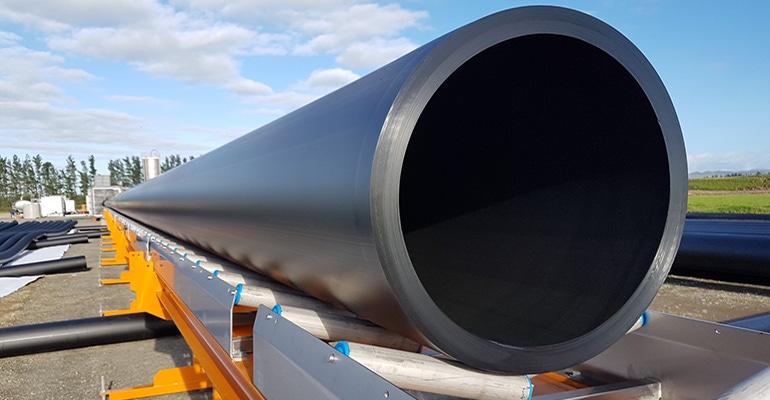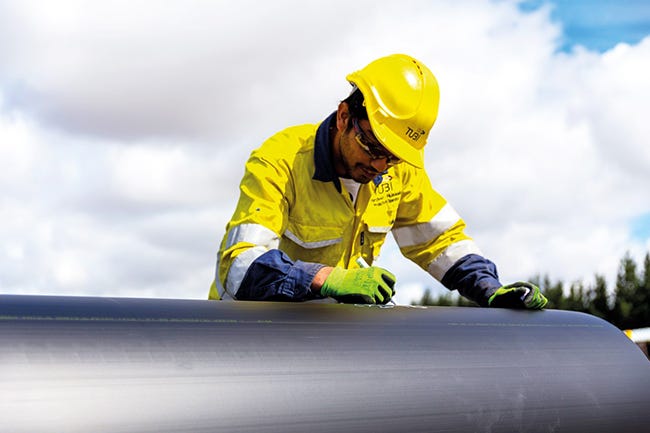The mobile extrusion plants can be packed onto flatbed trucks and hauled to project sites in 72 hours to manufacture high-density polyethylene (HDPE) pipe.
November 3, 2020

Tubi USA Inc. has launched a patented Mobile Modular Extrusion system that reduces logistics, installation, and handling costs for high-density polyethylene (HDPE) pipe used in the mining, oil and gas, irrigation, and municipal water and wastewater industries.
The modularized production units operate at Tubi’s sites or each client’s site, directly reducing the cost of pipe transportation and ensuring a certainty of supply at each plant for exclusive client use or for other customers. These mobile extrusion plants can be packed onto flatbed trucks and hauled to project sites in 72 hours to manufacture HDPE pipe for a range of infrastructure projects. In the current pandemic, Tubi can move its modular plants where needed and operate at 100% capacity compared to traditional pipe manufacturers in permanent facilities who may face capacity limitations in a down market.
|
The mobile extrusion plants can be installed at Tubi’s sites or each client’s site. Image courtesy Tubi. |
“Our game-changing modular technologies address the needs of an ever-increasing and far-spanning global community,” said Marcello Russo, Tubi CEO. “With our geographies widening, there is a real demand to utilize more efficient, flexible, and sustainable methods of operation.” The new technology eliminates the risk of handling large pipe lengths while delivering sustainability advantages by reducing truck traffic. The mobile factories can be moved to strategic locations, providing increased flexibility compared with conventional brick-and-mortar plants.
Public road transportation is currently seen as the only viable way of delivering pipe, rendering the extrusion of long-length pipe impossible, according to the company. Tubi’s modular extrusion plant offers unprecedented lengths of weld-free pipe produced directly on-site, reducing up to 95% of conventional weld joints. The plant can extrude 4- to 26-in pipe and has capability for up to 48 inches in lengths of 500 feet or more. Each modular extrusion factory has annual capacity of 20 million pounds.
An accredited and certified pipe manufacturer, Tubi provides the highest quality standards which are directly integrated into this technology, with a quality control unit incorporated within the modular design. The company utilizes inline x-ray and center wave technology processes along with the pipe standard requirements, which yield high-quality HDPE pipe with a long service life and proven durability.
Tubi has established a new mobile manufacturing site in Bartow, FL, with two plants that are now both fully commissioned and operational. The company won a large project and then leased space from Mosaic Co., which is the largest fertilizer producer in the world. Mosaic is using Tubi pipe for processing wastewater from phosphate mining. Tubi is producing the pipe in 500-foot lengths. “No one has done that on land before and Tubi also successfully produced 1,000-foot lengths of 16-inch pipe,” said Wes Long, Tubi COO.
The two new Florida plants have significant technological upgrades, with production lines capable of the highest production rates and the most advanced quality-control monitoring in the world, according to Tubi. Previously, the Florida HDPE pressure pipe markets were geographically isolated from HDPE pipe manufacturing plants. Direct access to the new Tubi plants in central Florida reduces freight and installation costs, improves safety, reduces carbon emissions, and creates local jobs.
Tubi also currently operates a mobile extrusion plant in Odessa, TX, with plans to move a fourth new mobile extrusion plant to Tucson, AZ, to serve the Southwest mining industry.
In New Zealand, Tubi’s mobile manufacturing unit produced 105 miles of HDPE pipe for irrigation of 50,000 acres of farmland. The logistics of delivering pipe in this rural area were significantly improved. The irrigation pipe was produced on site in 100-meter (328-foot) lengths.
About the Author(s)
You May Also Like



